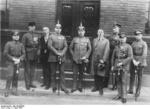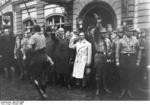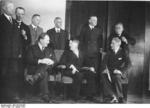Wilhelm Frick
| Surname | Frick |
| Given Name | Wilhelm |
| Born | 12 Mar 1876 |
| Died | 16 Oct 1946 |
| Country | Germany |
| Category | Government |
| Gender | Male |
Contributor: C. Peter Chen
ww2dbaseWilhelm Frick was born in Alsenz, Bavaria, Germany to a father by the same name, a school teacher, and Henriette Schmidt Frick. In the 1890s, he studied at the University of Göttingen and the University of Berlin. In 1901, he obtained a doctorate degree in law at the University of Heidelberg. In 1903, he became a lawyer at the police headquarters in Munich, Bavaria, Germany; he saw steady promotions through the 1910s. In 1910, he married Elisabetha Emilie Nagel; they would have two sons and a daughter. In Nov 1923, as a police official at Munich, he participated in the failed Beer Hall Putsch. He was arrested, tried for treason in Apr 1924, and was found guilty. He was given a 15 months prison sentence, and was dismissed from his job at the police. In May 1924, he was elected to the Reichstag. Between 1930 and 1931, he was appointed Minister of the Interior and of Education in the state government of Thuringia; he was the first Nazi Party member to hold a ministerial level post. In Jan 1933, he was appointed by Adolf Hitler as the Minister of the Interior, and later that year his political influence increased dramatically, having all state governors report to him, as Hitler began to consolidate his power. In 1934, Frick divorced Elisabetha Emilie Nagel, and later in the year married Margarete Schultze-Naumburg, with whom he would have a son and a daughter. In 1935, he was granted the power to appoint mayors of all municipalities with populations greater than 100,000, except for Berlin and Hamburg, where Hitler reserved the right to appoint the mayors. In regards to anti-Semitism in Germany, Frick was responsible for many of the pre-war racist laws. He also passed legislation for universal military conscription, which was a direct violation of Versailles Treaty.
ww2dbaseToward the end of the 1930s, Frick began to lose influence after a power struggle with other Nazi Party members. In 1936, he lost the power over police to Heinrich Himmler, who was among his greatest political opponents. In 1943, Himmler replaced Frick as the Minister of the Interior. He was the Protector of Bohemia and Moravia until the end of the European war; at that position, he was known for his ruthlessness when dealing with dissent.
ww2dbaseAfter the war, Frick was arrested and tried at the International Military Tribunal at Nuremberg, Germany. He was one of the only two defendants (with Rudolf Heß) who refused to testify on his own behalf. He was ultimately found guilty of war crimes and crimes against humanity, among others. He was sentenced to death by hanging on 1 Oct 1946, which was carried out 15 days later. Journalist Howard K. Smith wrote about his execution:
ww2dbaseSource: Wikipedia.
Last Major Revision: Jul 2009
Wilhelm Frick Interactive Map
Photographs
 |  |  |  |
Wilhelm Frick Timeline
| 12 Mar 1876 | Wilhelm Frick was born. |
| 24 Aug 1943 | Wilhelm Frick was named Protector of Bohemia and Moravia. |
| 16 Oct 1946 | Wilhelm Frick passed away. |
Please consider supporting us on Patreon. Even $1 per month will go a long way! Thank you. Please help us spread the word: Stay updated with WW2DB: |

» Nuremberg Trials and Other Trials Against Germany
- » 1,182 biographies
- » 337 events
- » 45,115 timeline entries
- » 1,248 ships
- » 350 aircraft models
- » 207 vehicle models
- » 376 weapon models
- » 123 historical documents
- » 261 facilities
- » 470 book reviews
- » 28,413 photos
- » 365 maps
Winston Churchill, on the RAF
Please consider supporting us on Patreon. Even $1 a month will go a long way. Thank you!
Or, please support us by purchasing some WW2DB merchandise at TeeSpring, Thank you!